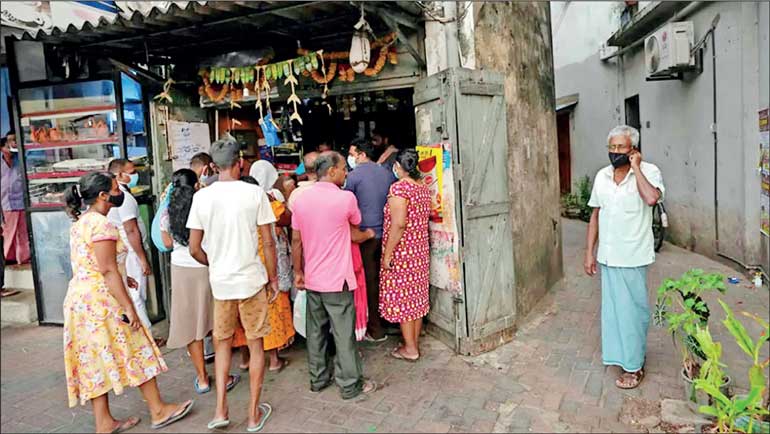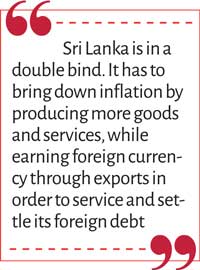Saturday Feb 14, 2026
Saturday Feb 14, 2026
Wednesday, 10 May 2023 00:05 - - {{hitsCtrl.values.hits}}

Inflation makes the richest wealthier and masses poorer
 Sri Lanka, like many countries in the neo-liberal free market economy zone, is at war with an accursed enemy, inflation. It is fighting this war with the only weapon it has and recommended by the Government’s economic advisor IMF, the agent of dollar imperialism. That weapon is to raise the interest rate by the Central Bank. In this war however, it is inflation that is destined to win, because it has imperial connections.
Sri Lanka, like many countries in the neo-liberal free market economy zone, is at war with an accursed enemy, inflation. It is fighting this war with the only weapon it has and recommended by the Government’s economic advisor IMF, the agent of dollar imperialism. That weapon is to raise the interest rate by the Central Bank. In this war however, it is inflation that is destined to win, because it has imperial connections.
It is a common belief among economists that a little bit of inflation is healthy to an economy, because it provides an incentive to work hard, produce more and make the economy grow. After all, which salesman or saleswoman for example would not feel happy to see more and more notes and coins filling his/her cash drawer? Yet, it is also said that a little bit of inflation is like a little bit of pregnancy and an unwanted pregnancy has to be aborted. Interest rate is therefore used as an inflation abortionist in modern economies.
The US Federal Reserve, soon after the collapse of the First Republic Bank which followed the earlier collapse Swan Valley Bank, has raised the interest rate for the 10th time by 0.25% to 5.25%, citing inflation the reason. Fed’s targeted rate is 2% but the current rate has escalated by more than 160%. Money market observers believe that the rate would rise even further. Australia has done the same for the 11th time and the current rate is 3.85%. Bank of England also raised its rate in March this year and for the 11th time to 4.25%. And, for the first time since 2011, Swiss Bank has raised its rate to 0.5% after years of negative interest rates. Dreaded inflation is creating financial panic in almost all developed economies and developing ones like Sri Lanka, who are part of the international monetary order, have no choice but to follow suit. But, is raising interest rate the answer to reduce inflation? It depends on the factors that cause inflation in the first place.
Milton Friedman, the Guru of monetarism, says inflation is always and everywhere a monetary phenomenon, because it has to be financed, whether it originated from demand-pull or cost-push sources. This is to ignore or deny any political or imperialist origins of inflation, which seems to be the case in the current inflationary wave. Therefore, resorting to interest rate to counter this enemy is going to be counterproductive as will be shown later.
There were two factors that played a key role in raising price level and consequently cost of living over the past two to three years. The first was the COVID-19 pandemic that started sometime in early 2021. Apart from causing over a million deaths, it debilitated its victims, restricted the mobility of people, and made transport of goods and services, both expensive and hazardous. In short, normal life and ordinary business of people were virtually paralysed by the pandemic.
Supply constraints that resulted from COVID-19 quickly introduced rationing of consumer items and emptied the shelves in supermarkets and other retail outlets. Prices escalated as a result and cost of living increased. The response to this shortage and price increase therefore is to increase production and facilitate transport and distribution rather than to raise interest rate to curtail consumer demand. As it happened, once the pandemic was brought under some control life returned to a new normality, and economic activities started picking up and prices began falling.
It was then the second factor entered the scene and started reversing the trend. This was the war in Ukraine, which broke out in 2022 and still continues without any sign of abating. This war has now turned out to be a proxy war fought against the Russian enemy by imperial America and its allies. History is witness to show that war and inflation are inseparable twins.
 To cut a long story short, this war would not have occurred had NATO, which was formed in 1949 to counter the threat from former socialist USSR and provoked the signing of the Soviet led Warsaw Pact in 1955, been dissolved once Gorbachev did the same to the Warsaw Pact in 1991. Instead, NATO continued to expand and threatened to encircle post-Soviet Russia. Shouldn’t Russia counter this threat? Russia’s invasion of Ukraine should be understood in this context before taking side.
To cut a long story short, this war would not have occurred had NATO, which was formed in 1949 to counter the threat from former socialist USSR and provoked the signing of the Soviet led Warsaw Pact in 1955, been dissolved once Gorbachev did the same to the Warsaw Pact in 1991. Instead, NATO continued to expand and threatened to encircle post-Soviet Russia. Shouldn’t Russia counter this threat? Russia’s invasion of Ukraine should be understood in this context before taking side.
Unlike the pandemic this war meant economic ruination of the two combatants, Ukraine and Russia. The damage it has caused to food and industrial production in Ukraine, which is a bread basket in Europe, and to gas and petroleum and other exports from Russia has been phenomenal. It is this supply constraint generated by this unwanted war that is the primary reason for increasing prices of many consumer items. The upshot is inflation.
War increases the demand for weapons, and allocation of more resources to the armament industry would mean less is available for production of other goods and services. According to the Stockholm International Peace Research Institute (SIPRI) a total of $ 2.24 trillion or 2.2% of world’s GDP is spent on armaments and in preparation for another war. Against whom? China? Of that total however, US, China, and Russia account for 56%.
Resource deprivation to other productive sectors would naturally cause scarcity and increase price. More resources are also needed to reverse climate change, which is another phenomenon giving rise to supply constraints. This inflation therefore is not demand-pull but cost-push with imperial roots. But the Central Bank chiefs are not willing to call a spade a spade and speak up to press their governments to stop supporting the imperial war in Europe. Instead, their faith in tight monetary policy and higher interest rates to fight inflation could turn counterproductive. How?
Inflation makes the richest wealthier and masses poorer. Rise in cost of living is therefore creating resentment against governments and people are demanding financial relief to cope with price increases. In Australia for example, the ruling Labour Government is promising that relief is around the corner with its forthcoming budget to be presented to the parliament shortly. The Treasurer is promising to put more money in peoples’ pocket. What this would do is to turn the cost-push into demand-pull inflation, which in turn would necessitate even more interest rate rises. Then real income of people is not expected to recover until 2024 if the Treasurer were to be believed. In fact, the Reserve Bank Governor of Australia has kept the door ajar for future rate increases even though the Governor says that the fall in inflation is faster than expected.
The story is not very different in other mature economies also. In Sri Lanka too, President Ranil Wickremesinghe, with consent from IMF, is promising to provide relief to low-income earners and other groups. In the absence of increase in supply, won’t this relief increase demand, increase prices and feed inflation?
Sri Lanka is in a double bind. It has to bring down inflation by producing more goods and services, while earning foreign currency through exports in order to service and settle its foreign debt. It is worth reminding readers what the father of economics Adam Smith had to say on debt. “When national debts have once been accumulated to a certain degree, there is scarce, I believe, a single instance of … (them) having been fairly and completely paid.” He went on to add that “the raising of the denomination of the coin has been the most usual expedient by which a real public bankruptcy has been disguised under the appearance of a pretended payment” (Stephan Legge, “Letter: What Adam Smith said on inflation and debt trap”, Australian Financial Times, January 19 2022). With rising inflation, Sri Lanka has no way of “raising the denomination of the coin” and engage in “pretended payment”. The forthcoming debt restructuring negotiations are therefore going to be a challenging task to local negotiators.
The current wave of inflation at home and abroad is therefore not caused by increase in demand but by shortages in supply. Shortages at home are the product of a historic mismanagement of the local economy, which is trapped in the machinations of a corrupt and nationalistic political culture and ideology. The shortages abroad are the consequence of an imperial misadventure caught in a banking and financial crisis. Both require increase in production and that is the only answer to inflation.
(The writer is attached to Murdoch Business School, Murdoch University, Western Australia.)